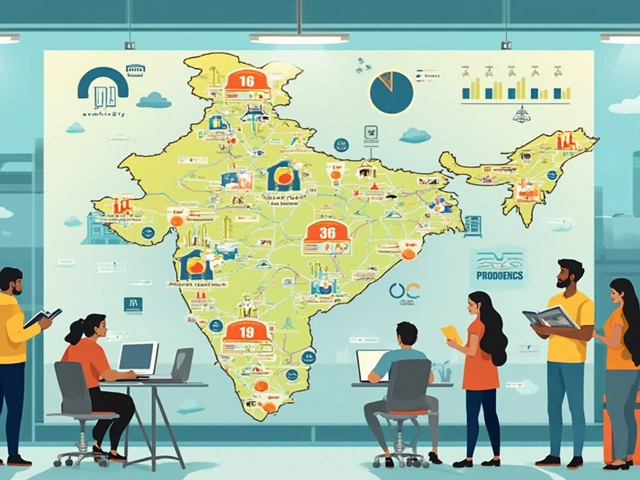
The ever-changing job market keeps us on our toes, doesn't it? In a world where technology advances in the blink of an eye, staying relevant is the secret ingredient to career success. More than ever, online courses are proving to be a cornerstone for building and enhancing skills. They're not just alternatives but a new norm for education, offering the flexibility to learn from the comfort of your own home or wherever you fancy.
As 2024 unfolds, several online courses have stood out as lucrative in terms of job prospects. These courses are designed to cater to modern industry needs, including fields like technology, business, healthcare, and creative industries. Each of these arenas reflects how digital learning can effectively prepare learners for the workplace challenges of tomorrow. Let's dive in and explore some options that might just pave the way for your next big career move.
- Emerging Trends in Online Learning
- Technology Courses: Coding and Beyond
- Business and Management Online Prospects
- Healthcare and Online Medical Training
- Creative Industries: Design and Media
- Tools for Choosing the Right Course
Emerging Trends in Online Learning
Online learning has transformed the educational landscape, especially noteworthy in the past decade. Picture this: a bustling digital classroom where traditional boundaries dissolve, leaving behind limitless potential for growth. Courses have become more accessible and tailored to specific industries, allowing learners to develop skills pertinent to today's job market. One of the most significant trends is the use of artificial intelligence in personalizing the learning experience. AI-driven platforms adapt courses according to individual learning paces and styles, ensuring that the information delivered is effective and engaging. Just think about how revolutionary that is—education that truly adapains to you.
Another noteworthy trend is the integration of augmented reality and virtual reality into online courses. These technologies add a whole new dimension to the learning experience, making it possible for students to engage in immersive environments. For instance, medical students can perform virtual surgeries, engineers can construct models, and educators can create interactive lessons. This leap in technology not only enhances understanding but also keeps students eager and motivated. Imagine no longer being confined to textbooks but instead walking through a rainforest or examining the human heart from all angles virtually.
A robust shift towards micro-credentials is also changing the face of e-learning. These bite-sized, focused courses provide the essentials without the lengthy commitment of traditional degrees. Employers are increasingly valuing such certifications, which allow candidates to demonstrate specific competencies. However, the question remains—are employers truly valuing these modifications? According to a 2023 survey by Coursera, 72% of companies stated they view candidates with micro-credentials as equally or more favorably than those with conventional degrees.
"The digital age has democratized education," stated an analyst at Gartner.Indeed, short but potent learning modules can quickly adapt to the evolving requirements of the job opportunities marketplace.
Accessibility has further increased due to the proliferation of mobile learning and the ever-present expansion of the internet. As apps and platforms reach even the remotest corners of the globe, more learners are joining the digital education revolution. Courses can now be accessed on-the-go, which especially benefits those juggling multiple responsibilities. Picture being able to turn your morning commute into a classroom session, or transforming mundane chores into opportunities for professional development.
Community-based learning is making waves too. With forums and discussion groups becoming integral parts of online curricula, students experience the camaraderie typical of physical classrooms. Peer interaction facilitates networking and skill-enhancement opportunities. Reddit or LinkedIn communities, for example, often serve as spaces for discussions that add further value to the educational material. It's more interactive, more engaging, and certainly more supportive than speaking to a screen alone.
Finally, corporate investment in education and career pathways has surged. Many companies partner with online platforms to provide specialized training for their workforce, focusing on career growth as part of employee upskilling or reskilling programs. This shift signifies a direct connection between learning and employment, as organizations prioritize developing talent tailored to their specific needs. What's the result? A boon of job opportunities flowing directly from tailored online learning experiences. And so, the future hinges not just on adapting to new technologies but on embracing a culture of constant learning.
Technology Courses: Coding and Beyond
In the vibrant and dynamic sphere of technology, online courses in coding and related disciplines have become vital pathways to abundant job opportunities. The digital revolution has virtually touched every industry, leaving no stone unturned. From app development to data analytics, the demand for tech-savvy professionals is skyrocketing. This surge is due to businesses pivoting towards digital transformation and the ever-growing landscape of internet-based services.
Coding, once considered a niche skill, has now advanced to become a fundamental aspect of modern education. Learning languages like Python, JavaScript, and Ruby opens doors to various roles. What's fascinating is the adaptability coding offers; it's like a universal language connecting multiple sectors: finance, healthcare, entertainment, and more. The versatility of coding can't be overstated; it allows professionals to jump across fields with ease. It’s no wonder that tech companies are constantly on the hunt for talented developers, making this skill invaluable.
Beyond Just Coding
But it's not only about writing lines and lines of code. Courses now extend into other exciting areas such as artificial intelligence (AI), machine learning (ML), cybersecurity, and cloud computing. AI and ML, for instance, provide tools to create smart systems that learn from past behaviors or data trends. This knowledge is transforming industries, making processes more efficient, and offering personalized solutions to users. Cybersecurity, another critical area, is becoming increasingly important as more data is stored and transferred online. Securing information and protecting against cyber threats have become priorities, with businesses willing to invest heavily in security experts.
Cloud computing is another expanding field, due to the need for flexible, scalable, and cost-effective computing resources. Companies like Amazon Web Services (AWS), Microsoft Azure, and Google Cloud are leading the charge, creating ample opportunities for individuals trained in these platforms. These courses not only teach the necessary technical skills but also offer insights into best practices for implementation, management, and optimization of cloud services.
"The beauty of technology as a career is that it is a constantly evolving landscape. Continuous learning keeps professionals at the top of their game." - Tech Guru Weekly
According to a study by the International Data Corporation (IDC), worldwide spending on AI systems alone is expected to grow to $97.9 billion by 2025, more than two and a half times the spending level of 2021. Numbers like these prove that these are not just skills of the future, they are skills of the present.
Skills development in these areas requires commitment and a proactive approach. It involves staying current with trends, seeking projects and challenges that stretch one's capabilities, and constantly engaging with tech communities both online and offline. Navigating these courses often includes hands-on projects, which simulate real-world scenarios and thus better prepare learners for the demands of tech roles. Engaging in communities or hackathons can also enhance one’s learning experience, offering networking opportunities with peers and professionals alike.
Whether you dream of shaping cutting-edge technology or desire stability in a booming field, pursuing tech courses online offers an invaluable start. With the right skill set, passion, and determination, the realm of technology unfolds endless possibilities.

Business and Management Online Prospects
The bustling world of business and management never ceases to evolve, and online courses are bridging the gap between ambition and reality. With the shift towards remote work, the traditional MBA is now complemented by flexible online programs. These courses are not just about theory; they are designed to impart actionable insights to thrive in today's competitive landscape. Among the popular options are courses in project management, digital marketing, and entrepreneurial studies. Each course brings a wealth of knowledge for those looking to navigate the complexities of the corporate realm. The preference for skills over degrees in certain sectors has further boosted the demand for specific training that gets individuals job-ready.
The charm of online business courses lies in their ability to cater to a global audience. They offer the same curriculum as in traditional classrooms but with added convenience. With learning modules hosted online, participants gain access to a treasure trove of resources. Modules focusing on leadership, financial strategizing, and innovative thinking are crafted to enhance your decision-making prowess. Understanding market dynamics through such courses can set the foundation for career growth. This is especially true in sectors such as technology and finance, where rapid changes demand constant learning. A well-structured online course makes this growth both achievable and rewarding.
The statistics are compelling. According to a recent report, there is a projected increase of 10% in management roles through 2026. This rise underscores the importance of being well-equipped with the skills taught in these courses. Learning platforms like Coursera and edX have partnered with top-tier universities, providing accredited courses that add significant value to your profile. Harvard Business School’s online arm, for example, offers programs tailor-made for executive education, highlighting the potential of online learning.
"Continuous learning is the minimum requirement for success in any field," remarks Brian Tracy, a leading motivational speaker and author.As industries pivot towards skill-based hiring, online certifications gain more recognition. Businesses today seek individuals who can bring fresh perspectives and adapt efficiently, and these courses provide just the arsenal needed to meet these expectations.
Many learners find the format of online courses to be particularly engaging. With live webinars, interactive assignments, and peer discussions, the learning experience is enriched and dynamic. It's no wonder that professionals are flocking to these courses. By nurturing both soft and hard skills, they cater to all facets of business acumen. Their structured approach ensures graduates aren't just following trends – they're setting them. From small business owners to corporate ladder climbers, everyone stands to benefit. As we navigate an era redefined by the digital, the prospects in online business education paint an inspiring picture.
| Year | Management Role Growth |
|---|---|
| 2024 | 8% |
| 2026 | 10% |
Healthcare and Online Medical Training
As our world becomes more complicated, healthcare plays a pivotal role in maintaining the fabric of society. Driven by technology, the sector is embracing online learning as a powerful tool to train professionals effectively. The shift towards digital platforms for medical training is not only timely but necessary, given the increasing demand for healthcare services. Online courses now cover a vast array of topics, from basic healthcare management to advanced nursing practices, making quality education accessible to more aspiring professionals across the globe.
This move to online education addresses a fundamental challenge: the shortage of skilled healthcare workers. Online programs offer flexibility that traditional settings often don't. They ensure that students from diverse backgrounds, such as working professionals or those residing in remote areas, can access these courses with ease. A study by the World Health Organization indicates that e-learning is as effective as conventional learning methods in the healthcare sector. Such revelations underline the potential of online medical training to enhance the skills and knowledge required for effective healthcare delivery.
One of the most exciting aspects of digital transformation in healthcare education is the enriched learning experiences. Various platforms integrate simulations, virtual labs, and interactive content that give learners a more hands-on experience. This method of learning ensures students not only grasp theoretical knowledge but also apply practical skills crucial in real-life scenarios. The flexibility of study hours and the possibility to repeat modules for better comprehension are bonuses that modern online courses offer.
Besides, the introduction of online medical courses has led to widespread innovations in course delivery. Institutions now collaborate globally, bringing various experts together under one virtual roof. Imagine learning cardiology from top doctors in the United States while understanding public health from renowned specialists in Europe. Such opportunities not only broaden the horizons for students but also foster a global understanding of healthcare systems, best practices, and innovations. According to a recent article in the Journal of Medical Internet Research, online training significantly improves adaptability among healthcare workers in periods of crisis, such as the COVID-19 pandemic, highlighting the resilience and agility fostered by digital education.
Of course, navigating the plethora of available courses can be daunting. Aspiring healthcare professionals should look out for programs that are accredited and recognized by professional bodies. This ensures the education received meets industry standards and can be trusted to help secure employment or further career advancements. Institutions like Coursera, edX, and FutureLearn offer courses in collaboration with leading universities and professional bodies, ensuring a blend of theoretical and practical knowledge that can easily translate into tangible job skills.
The benefits of engaging in online healthcare training extend beyond just education; they also significantly impact career prospects. According to the Bureau of Labor Statistics, the healthcare industry is expected to grow by 13% over the next decade. This boom is projected to create millions of new jobs, ranging from medical assistants to health information technologists and beyond. By participating in online courses, individuals can position themselves strategically within this dynamic field, equipped with the skills necessary to thrive.

Creative Industries: Design and Media
Ah, the world of design and media! This sector holds a special allure for many, often celebrated for its dynamic blend of creativity and technology. In 2024, the demand for talent in the creative industries remains robust, with a slew of online courses offering pathways into exciting careers. Whether you’re looking to delve into graphic design, digital media, or animation, the options are as diverse as they are plentiful. One of the standout elements of courses in this field is their adaptability to the fast-paced digital transformation, which has prompted a surging demand for skills like user experience design and video production. It's not just about crafting visually appealing elements anymore; it's about building comprehensive solutions that resonate across various platforms. From social media channels to immersive virtual realities, design and media have truly expanded their horizons.
Graphic design remains a cornerstone of the creative sector, with courses often spanning a broad curriculum that covers everything from traditional art theories to cutting-edge software tools. Adobe Creative Suite still dominates, but students are increasingly finding value in learning open-source alternatives like GIMP or Inkscape. Animation and motion graphics courses are equally enticing, drawing on the vibrant worlds of cinema and advertising to craft compelling narratives. These courses usually emphasize storytelling, character development, and special effects, skills that are indispensable in creating engaging content. As a fascinating addition, many courses offer modules on augmented reality (AR) and virtual reality (VR) design, turning science fiction into tangible reality.
Let's talk about digital media now. Courses focusing on digital content creation have emerged as hot favorites, particularly in digital marketing, content management, and interactive media design. They equip students with the skills to strategize and execute content campaigns across various digital landscapes. According to a report by the U.S. Bureau of Labor Statistics, jobs in digital media are projected to grow by 14% through 2031, significantly faster than the average for all occupations. This trend reflects the increasing importance of digital presence for brands and businesses, creating ample job opportunities for those well-versed in media relations and content strategies.
"The future of creative industries lies in an intricate balance between artistry and technology," explains Victoria Baker, a renowned creative director. "Those who can marry these two realms will always have the upper hand in the job market."
To aid job seekers, many online platforms have introduced career-focused learning paths, which blend theoretical knowledge with practical, project-based work. Institutions like Coursera and Udemy offer courses certified by leading universities, while platforms such as Skillshare provide workshops taught by industry professionals. These courses typically integrate real-world projects that mimic industry tasks, allowing learners to build a portfolio that showcases their skills to potential employers. For those venturing into these creative fields, it’s crucial to keep an eye on trends, such as the continual rise of AI in creative processes and the influence of social media dynamics.
Tools for Choosing the Right Course
Choosing the right online course can feel like wandering through a digital market where every stall promises something invaluable. To navigate this vibrant bazaar, tools and strategies can make all the difference. The essence of making an informed choice lies in analyzing where your interests align with market needs. Today, numerous platforms offer insights into course ratings, industry demands, and career outcomes. Websites like Coursera and LinkedIn Learning provide user reviews and alumni success stories that can offer glimpses into how a course could potentially shape your career trajectory.
Consider tools like Google Trends, which can provide you with data on what skills are seeing increased interest globally. A thorough glance at LinkedIn's skill reports reveals which technical and soft skills recruiters are currently valuing. Combining this data with your personal career aspirations helps in narrowing down choices. Also, remember to assess the credibility of the institution offering the course, as courses with certification from well-known universities or companies often add more weight to a resume. It's essential to verify if the certification is recognized in your desired industry, as this can make a significant impact during job interviews.
One critical factor is understanding your learning style and how well a course structure complements it. Are you someone who learns better with hands-on projects, or do you prefer in-depth theoretical understanding before applying concepts? Most online platforms provide previews or trial periods, so make use of these offers to get a feel for the content delivery. A flexible course that aligns with your availability without compromising learning objectives is always a safe bet. Job opportunities are heavily tied to how effectively skills translate into real-world applications, so courses offering practical projects or internships tend to stand out.
Sometimes, a wise word helps:
“The future belongs to those who learn more skills and combine them in creative ways.” – Robert GreeneThis quote underscores the importance of versatility in today's world where interdisciplinary skills open doors to more diverse roles. Embrace tools like Skillshare or edX's forums to connect with peers who are also making these crucial decisions. Their experiences can offer fresh perspectives you might not have considered initially.
To put your decision-making to the test, draft a plan. List the pros and cons of each course, how each aligns with your goals, and potential sacrifices you'll need to make. Once you've shortlisted your choices, dive deeper into potential career paths. Can the skills promised by the course give you a stepping stone toward a dream job? Does it offer networking opportunities with industry professionals who might one day be colleagues or mentors?
In essence, the right tools not only guide your choice but help create a roadmap for turning learning into a meaningful career journey. So, tap into community reviews, data analytics, and personal reflections as part of an integrated strategy for choosing the perfect online course to enhance your skills development and position yourself effectively in the job market.
More Articles

Unlocking Government Employment: Essential Tips and Insights
Navigating the path to securing a government job can be a daunting process, filled with challenges and competition. This article offers valuable insights into the hiring practices of government agencies. Readers will learn about the essential qualifications and skills needed to stand out in the application process. Additionally, practical tips will be provided to improve one's chances of successfully securing a government position. Understanding the intricacies of government hiring can significantly boost an applicant's confidence and capability.

Understanding Low Salaries in Government Services and Their Impact
The article dives into the reasons behind low salaries for government services, focusing on factors like budget constraints and traditional pay structures. It also explores how these salaries compare to the private sector and the implications for job seekers. Tips for aspiring government employees to navigate these challenges are included. The piece aims to help readers make informed decisions on pursuing government careers.

How Many IIT Seats Are There in India? Your Complete 2025 Guide
Curious about how many seats are available in IITs across India for 2025? This article breaks down the total seat count, explains how reservations and branches affect your chances, and shares clever tips for increasing your odds. Find out which IITs offer the most options and bust some myths about ‘safe’ branches. Don’t miss practical advice on planning your target list based on real numbers.
